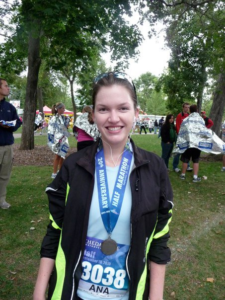Taking the Leap: From Half Marathons to Ultramarathons

I’ve often been asked, why (and how) did I make the leap from half marathons to ultramarathons? After I respond, the person’s follow up comment usually is, “I could never do that.” Guess what? You totally can! I’m an average runner (with occasional delusions of grandeur), so if I can do it, you can too. If you’re considering it, I’ve got some tips below!
First, let me attempt to answer the why and the how I made the leap to running ultramarathons.
The Why: My original reason for making the leap was morbid curiosity. Could I really run for 50 miles? You might say, hey crazy lady, aren’t marathons enough? Don’t get me wrong, marathons are challenging. However, like many other runners, I read Born to Run and was inspired. Before that I had no idea that ultras were even a thing, and I had nothing but admiration for those incredible athletes who could run for hours and hours! I never thought I’d be able to do it, but was intrigued by the idea of spending all day out in nature. I’d always loved running long distances, and thought maybe I’d try something like it someday. I never thought I was quite ready to make the leap up to a 50 miler, but then I realized that the only thing keeping me back was fear. And, frankly, that’s a stupid reason not to do something that I’d been dreaming about for years.
I also got tired of the focus on finishing times in road races. Everyone seemed to be there to get their PR and there was no real community. I just wanted to run long distances and enjoy it with other people! While I sometimes have time goals in trail races, every course is drastically different, so comparing times between races is really a useless exercise. In trail races, everyone is out there together, and helping each other reach the end. (Well, I guess I can’t speak for the folks racing to win, but everyone else for sure!) It’s more about challenging yourself and enjoying the journey with others.
So then we get to…
The How: It’s not a sexy response nor any big secret. I gradually increased my mileage in training and racing over the course of multiple years. I took quite a long time to finally reach 100 miles, but that’s because I wasn’t sure I even wanted to try a 100 miler. I feared the mental piece of the race, and didn’t think any of my friends deserved dealing with a grumpy, whiny, sleep-deprived rancor that I was certain I’d become in the middle of the night.
I know plenty of people who took less time to reach their goal ultramarathon, but hey, everyone’s journey is different! Of course, no one really jumps from a half marathon straight to a 100 miler all in one go. (Or, if you did, I have some questions for you.) Thinking of it that way is daunting and seems completely ridiculous to any rational person. On a related note, spoiler alert: ultramarathoners are not known for their rationality. 😉

Here are my “first” milestones to illustrate my point:
- First half marathon: Fall 2010 – Fox Cities Half Marathon (WI)
- First marathon: Summer 2011 – North Olympic Discovery Marathon (WA)
- First 50 miler: Fall 2014 – North Face Endurance Challenge 50 miler (WI)
- First 100 miler: Fall 2017 – Javelina Jundred 100 miler (AZ)
Just like with any race, you train up to the distance. However, as the ultra distance increases, it becomes more mental than physical. While that might sound insane, let me explain! Conventionally, with a marathon, you train up to about 20 miles, and you trust that you can do the extra 6. With a 50 miler, you usually train up to 31 miles, and you trust that you can do the extra 20. With a 100 miler, you train up to a 50 miler (with some back-to-back days of 20+ miles in training), and you trust that you can do the rest.
Essentially, your mind needs to trust in your training and preparation, and believe that you can do the extra mileage. Your body is capable of amazing things if given an opportunity like an ultra. And while there is physical pain with these distances (duh), your mind can make or break you. The feeling of accomplishment at the end of the race is really something special, and I promise it’s all worth it!

Okay, so you want to make the leap to run an ultra. How do you go about it? While this is really just the tip of the iceberg, here are a few tips to start you on your ultra journey!
- Find some like-minded runners to join you on training runs. Not sure where to find groups? Ask around at your local running shop! In 2014, Phil, the owner of Seven Hills Running Shop in Seattle told me about the High Heel Running Group – an amazing group of ladies of all abilities who love to run the trails. Many of these badass women are not only my friends, but also my go-to training partners for adventures and training runs. <3 There is also a multitude of groups on Facebook that are a great source for finding training partners.
- Find/create a training plan. Lucky for you, ultrarunning is growing rapidly, and there are a lot of great books out there for budding ultramarathoners. When I started, there really only was Bryon Powell’s Relentless Forward Progress. I’d also highly recommend Krissy Moehl’s Running Your First Ultra or Hal Koerner’s Field Guide to Ultrarunning. All of these books have training plans that you can use, and are full of other great tips.
- Make sure you do your long runs. I cannot emphasize enough the importance of long runs! There is no shortcut to being able to run an ultra. You have to put in the time. Adding a few miles each week to your long runs is the best way to make sure your joints, tendons, and muscles can handle the challenge. Miss a speed workout during the week? Not a huge deal unless you’re an Olympian. Do not miss a weekend long run.
- Quality is more important than quantity. Getting your training done is super important, but don’t be silly about it. If you’ve consistently run 30 miles/week and then jump to 70 miles/week, you’re asking for trouble. Injury and overtraining are common problems in ultrarunning. Don’t add extra ‘junk’ mileage just to see how high you can get. It’s more important to get your weekend long runs in and do some quality tempo and hill workouts during the week.
- Get the support of friends and family. While ultrarunning does NOT have to be all-consuming, it does take more time and dedication than your average weekend warrior fitness plan. Training becomes much easier when you have a supportive partner who’s willing to pick up a bit of slack back at home while you’re away playing out on the trails. And yes, you can do this as a parent! I have many friends who have multiple kids and have it all figured out with their family. Also, come race day, it’s really fantastic if your friends/family are there to cheer you on or leave encouraging notes in your drop bag. While ultrarunning sometimes can feel like a selfish solo endeavor, people love to be a part of something epic like this. It gives them bragging rights too!
- Be willing to try a lot of things and find what works best for you! The right gear is important since you’re going to be spending an inordinate amount of time with it. Ultrarunners love to talk about the pros and cons of gear, shoes, and packs. You also will need to find the right anti-chafe product for you – it’s the key to avoiding surprise pain in the shower post-run. You also need to find the right trail food for you. What works for me may not work for you. Some friends can down pizza at aid stations, while others can only sip on gels. We’re all an experiment of one. Put your training runs to good use and try all of the foods!
- Be prepared to learn new things about your body. Long hours on the trails means you’re going to chafe in places you never thought possible. You might acquire a new appreciation for pickles and PB & J. Muscles you didn’t know you had will get sore. Your stomach will unexpectedly rejoice at some foods and shockingly rebel at others. Blisters will also appear in weird places on your feet. You’ll also become a lot more comfortable with peeing/pooping in the woods. Hm, that all sounds unappealing. Here’s a positive:
- You will be astonished at what your body can accomplish with a little food, water, and a day on the trails.
- Be prepared to learn new things about your mind. Your mind becomes your biggest enemy and your greatest ally. It can talk you out of finishing a race that isn’t awful (but not great), or it can talk you into finishing a race when it has all hit the fan and you’re kind of a hot mess. You might also end up hallucinating in the middle of the night…so, that’s fun. Really, though, you will gain a new appreciation for what you can accomplish with your mind in the right place, despite physical adversity.
- Figure out your why. Why are you taking on this challenge? My ‘why’ has changed over the years, and is complex enough to warrant a separate post some other time. You do need to figure out why you want to put in all of the time and effort to take on this challenge because it’s a looooooong way to go if you’re heart isn’t in it. Is it the physical challenge? Is it your family and friends supporting you? Is it the solitary hours in beautiful locales? Find your inspiration, and that will help motivate you when you’re at that dark place in a race and you question your life choices. The struggle is always worth it to me, but you need to find out why it will be worth it to you.

Ultras have a way of stripping you raw physically and emotionally, and it’s a fascinating way to learn more about yourself and what you’re really made of. They are also a great opportunity to see more of your local trails than you’d be able to just hiking. Lastly, ultras are also a fun way to challenge yourself in our relatively cushy lives and really test your grit. It’s a great community of people, and I’m so grateful I found them years ago!
So, my fellow ultrarunners, what made YOU take the leap? What are your tips for people new to the scene?


